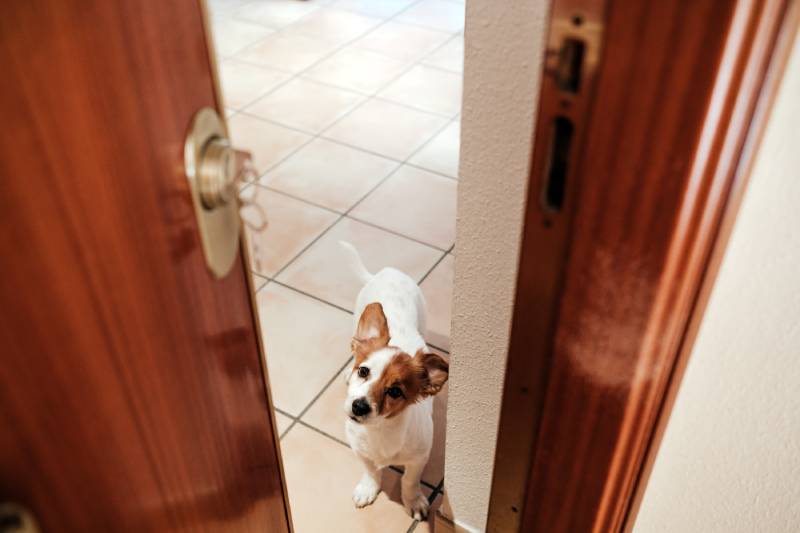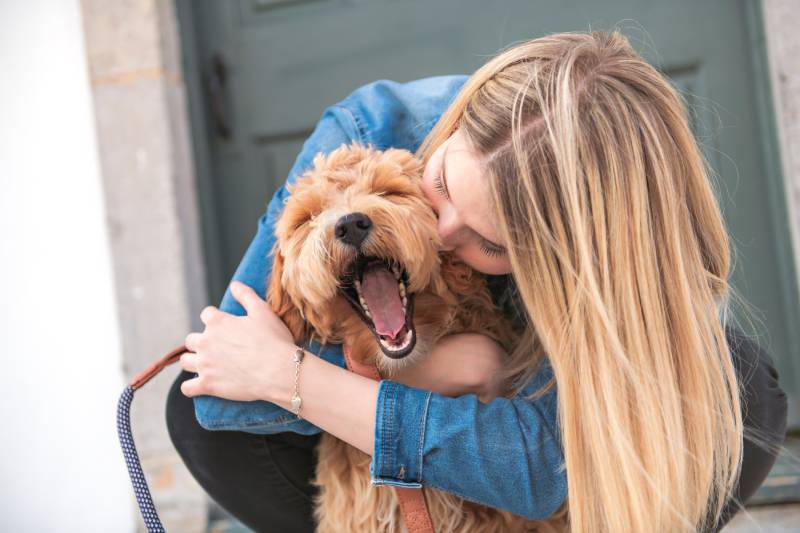How to Stop a Dog from Scratching Doors: 9 Simple Practices

Updated on

The sound of your dog scratching at the door can unleash visions of splintered wood and flaking paint. It leaves doors ugly and has the potential to cause splinters in dogs’ paws. But it is an all-too-common occurrence in some dog owners’ homes. Dogs typically scratch doors because they want to get to the area on the other side, but some may do it through frustration or because it is a learned habit. Destructive behavior can also be a symptom of separation anxiety or some other issue at home.
You can’t leave every door open all the time, so below we have included 9 ways to help stop your dog from scratching doors.
The 9 Simple Practices That Will Prevent Dogs From Scratching Doors
1. Walks
Prevention is better than any other method—if it works. Ensure your dog is thoroughly exercised before you leave the house, or go to bed at night, if this is when the scratching occurs. A tired dog is a well-behaved dog, and if your pup is sleeping for the hours you’re away they won’t be scratching at the doors.

2. Distractions
Whether you’re in the room where the scratching occurs or not, you can provide distractions that will take your dog’s attention away from the door and to something less destructive. Ensure they have plenty of toys, and ideally some interactive toys. Interactive toys provide mental stimulation, and examples include treat toys that can be packed with healthy treats, maze puzzles, and more. Alternatively, your dog might be content with a new tennis ball or stuffed toy.
3. Regular Yard Breaks
Dogs don’t have too many ways to tell us they need a pee or poop. One way is to scratch at the door that leads outside. If your dog can’t directly get to that door, they may scratch at another door, especially if it does lead to the main door.
- Adult dogs typically need to wee between three and five times a day, but yours may need to go more often than this. They especially need to go outside after meals, when they also usually have a large drink of water, or if they have been home alone or confined to a crate for several hours.
- Puppies need to pee much more often, with very young puppies needing to go every hour or so, and even older puppies needing to be let out every couple of hours.

4. Try Crate Training
A dog might scratch at doors as a sign of anxiety, and one cause of this anxiety can be that they feel a responsibility to guard the house. Crate training is a good way to reduce anxiety. The dog feels comfortable in its crate after some time acclimatizing, because it doesn’t have to guard the whole property and can’t see out of the window or the door to cause disruption or upset. Crate training can take time, but it can also be very effective in the long run.
5. Calmly Leave and Return
Some dogs scratch at the door when their owners leave. Some also learn routines and may scratch at the door when they expect their owners to return. Be calm when leaving the house, don’t reinforce your dog’s fear of being left alone, and, if possible, start with small trips out of the house, gradually increasing the time you’re out. When you do get home, don’t immediately give your dog fuss or treats, wait until you’ve got your coat off and walked around the house for a few minutes. This can help the excitement level of your dog when you get home.

6. Ignore It
If your dog does start scratching, it might be doing so to get attention. If you react by running over and opening the door, your dog knows that the scratching gets a response. It can be very difficult, but you can try ignoring the behavior, as long as there isn’t a genuine reason for it. Ignoring your dog’s demands to go out for a poop can leave you with a very different problem.
7. Reinforce Positive Behavior
Whether you ignore scratching or use distraction or other techniques, you need to reward positive behavior. When your dog stops scratching or sits calmly near the door without scratching, offer lots of praise and possibly even a reward or two. Initially, you will need to do this straight away and every time they behave, gradually increasing the amount of time before you give a treat and then reducing the number of times a treat is offered. Your dog will learn that they get ignored when scratching but get treats when remaining calm.

8. Be Strict, But Not Harsh
Rather than ignoring your dog, you can tell them off for their unwanted behavior. Catch them in the act and give them a firm “no” command while looking directly at them. Then encourage them to do something positive like sit and give them a treat for successfully listening. Keep doing this and when you notice your dog sitting, rather than scratching, reinforce the behavior by giving treats. While you do need to be firm and consistent, you shouldn’t be harsh—don’t shout.
9. Be Consistent
You need to be consistent in your efforts to discourage a dog from scratching at the door. If you choose to ignore the behavior until you get a positive response, you will have to do this every time. If you opt for crate training, consistently put them in the crate when you go out and overnight. Similarly, be consistent with rewards and praise when you give them.

Conclusion
Dogs scratching doors can be potentially painful and dangerous for your dogs and leave an ugly splintered mess of wood at the bottom of the doors. The noise of scratching can be grating, and it is a habit that you will want to prevent. Using the 9 methods above, it is possible to stop your dog scratching when you’re out or encourage better behavior even when you’re at home. Be consistent, be patient, and, while you can reprimand your dog for scratching, don’t shout or yell at them harshly.
- See also: How to Fix Dog Scratches on a Wood Door
Featured Image Credit: eva_blanco, Shutterstock










